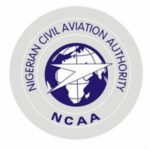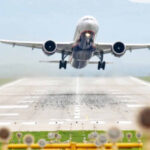Multiple designations for foreign airlines are pitching the federal government against domestic carriers, Daily Trust reports.
The issue of multiple designations for foreign airlines has been a recurring challenge in the aviation sector. Stakeholders are sharply divided over the propriety of allowing foreign airlines multiple entry points in Nigeria.
- Nigerians contributed over 1, 200 COVID-19 researches in 2 years – Coalition
- Religious manipulation reason for conflict in Nigeria – Minister
Over the years, many foreign airlines operating to Nigeria land in more than two destinations amid grumbling from domestic airlines which argue that such a decision is tantamount to killing the domestic market, more so when Nigerian carriers are unable to reciprocate in line with the principles of the Bilateral Air Service Agreements (BASAs).
Daily Trust further reports that many foreign airlines in Nigeria operate into multiple airports in the country. The latest to expand its footprint in Nigeria is Qatar Airways which recently increased its frequency to Nigeria to 21 weekly flights, landing in Lagos, Abuja, Kano and Port Harcourt.
Airline operators argue that if the foreign airlines had been restricted to one major airport, more opportunities would have been created for them in distributing the passengers.
Apart from Qatar Airways, several other airlines operate into multiple destinations in Nigeria. For instance, Emirates Airlines also operates 21 weekly frequencies to Nigeria – 14 to Lagos and seven to Abuja; Ethiopian Airlines operates to four destinations, Lagos, Abuja, Kano and Enugu; British Airways flies to Lagos and Abuja.
According to an analysis by the president of the Aviation Roundtable (ART), Dr Gabriel Olowo, Britain has 21 flights into Nigeria weekly. European Unions have 43 frequencies every week into Nigeria, while the Middle East has 56 flights weekly multiple entries into Nigeria.
Currently, Air Peace is the only domestic airline operating international flights, flying to Johannesburg, South Africa and Dubai, UAE. Azman also operates flights to Jeddah, Saudi Arabia.
The raging controversy over multiple designations was the subject of discussion last week during the ART breakfast meeting where stakeholders were sharply divided on the propriety or otherwise of multiple frequencies for foreign airlines.
However, domestic airline owners under the aegis of AON insist the granting of multiple frequencies is a way of frittering away the resources of the country and putting pressure on the country’s foreign currency reserve as the foreign airlines would always require foreign exchange to repatriate the money made from ticket sales.
Recently, it was revealed that Nigeria is owing foreign airlines $283m. This was the money accrued from sales of tickets which the airlines want to repatriate.
But operators say the request for repatriation of funds would reduce if the federal government stops granting multiple designations for foreign carriers.
AON president, Alhaji Yunusa Abdulmunaf, said, “All the foreign airlines that come into Nigeria, every day the central bank governor cries about the amount of money being repatriated abroad. We are talking about the scarcity of foreign exchange in the country, but the foreign airlines are removing billions of dollars every year from this country, and airlines in Nigeri have been hassled with lots of requests on how to repatriate dollars into the system. Where am I going to get it from?
“Yet we are creating more avenues for these things to happen by giving multiple destinations to these foreign airlines. All the foreign airlines that come to this country, maybe about 20 or 30 of them, have not been able to employ more than 150,000 Nigerians.”
Daily Trust reports that Nigeria currently has BASAs with over 70 countries which gives their airlines the freedom to fly into Nigeria. The federal government, in return, designates many Nigerian airlines to fly to those countries. However, due to the weakness of Nigerian carriers, they are unable to reciprocate.
Twenty two years ago, the federal government signed an Open Skies Agreement with the United States, but no Nigerian carrier currently flies to the US, leaving the Nigeria-US route an exclusive market for the American carriers. Delta and United Airlines have recently expanded frequencies to Nigeria; which points to the fact that the Nigeria-US route is not only viable but profitable.
Experts say the issue is complicated as the federal government is not ready to waive the huge revenues in dollars being generated from foreign airlines notwithstanding the fact that it exposes the foreign airlines to domestic markets.
The minister of aviation, Senator Hadi Sirika, who acknowledged that granting multiple frequencies to foreign airlines was against the Cabotage Act, however, argued that there were still opportunities for domestic airlines to distribute the passengers to the hinterlands.
Sirika said, “Nevertheless, there are prospects for domestic airlines as they have opportunities for improved domestic markets by distributing International passengers for connection with these airlines.
“The grant of multiple entry points to foreign airlines into Nigeria has been an issue of contention by the airline operators of Nigeria and experts in the aviation industry for quite a while.
“As we all know, a Bilateral Air Service Agreement (BASA) is between two countries and not between airlines. In a BASA, we have the sharing of frequencies and not the allocation of frequencies. We also have single entry and multiple entries into each other’s countries for passenger and cargo flights.
“Multiple entry points are granted to foreign airlines based on the nature of their BASAs. It expands the business and grows the economy of foreign airlines. It also generates revenue for the country as foreign airlines are able to land at different airports connecting different areas of the country to foreign countries thereby promoting commercial trade, tourism and friendly relations.”
In her intervention on the issue, president of the National Association of Nigerian Travel Agencies (NANTA), Susan Akporiaye, said there was nothing wrong for a foreign airline to depart from more than two airports.
She said, “My advice to the local airlines is that they should be able to connect Nigerians from the neighbouring states down to the regional base of the foreign airlines. Like in Kano, the airlines should think of how to bring people from Bauchi, Maiduguri, Katsina, Jigawa, Yobe, etc.
“The local airlines need to go back to the drawing board and work with the international airlines to know their timing so that they can use that same timing to plan out movements from other states to Kano. It’s a win-win for everybody.”
However, while some experts say instead of granting foreign airlines access to many airports, they should be encouraged to partner with the domestic carriers to bring in passengers from other airports. Others asked the domestic airlines to brace up for the competition in line with the global aviation best practice.
But as the federal government appears unwilling to reverse or withdraw multiple frequencies to foreign airlines, it is not clear how the domestic airlines which have threatened a lawsuit hope to prosecute their case.
Until then, the issue of multiple entries/frequencies for foreign airlines will continue to dominate discussions in the aviation industry.

 Join Daily Trust WhatsApp Community For Quick Access To News and Happenings Around You.
Join Daily Trust WhatsApp Community For Quick Access To News and Happenings Around You.


